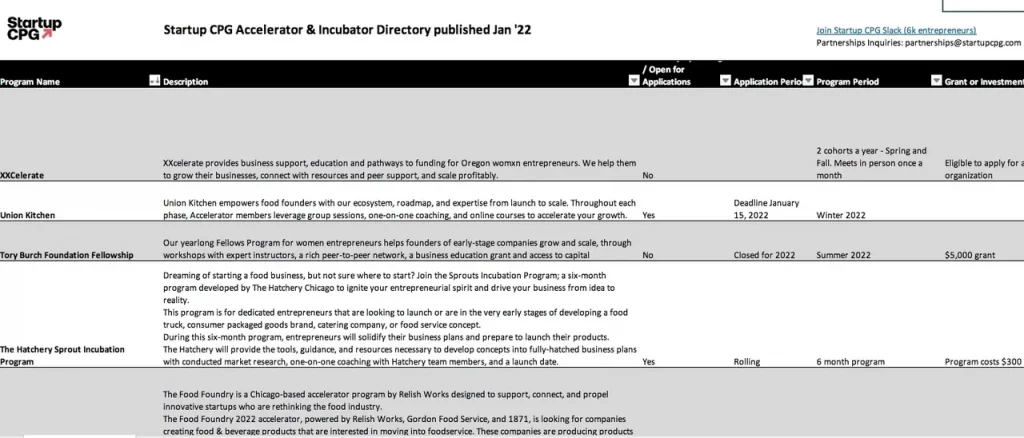Incubator
Resource Drop
Sarah Nathan is Founder of the CPG consulting group Bloom CPG. This resource is proudly sponsored by Buttermilk Creative, a leading packaging design and branding studio.
Startup CPG and Buttermilk Creative are proud to bring you a list of all of the Accelerators & Incubators we identified for CPG / Food & Beverage
It seems these days an equal number of incubators and accelerators are both popping up and shuttering. There are many reasons for a large corporate, a regional economic development organization, or a venture capital firm to start an incubator and accelerator, as well as reasons it no longer fits into their budget or corporate structure. Each have their own goals and KPIs as you have yours. Something to keep in mind when deciding whether an incubator or accelerator program is right for you and your business.
Incubators and Accelerators (using these words interchangeably, as the industry does too) can be an excellent way to fast track your business, learn from top in class mentors willing to give their time and expertise, surround yourself with peers working through the same struggles, and possibly even receive an infusion of cash that can help you activate and accelerate the program’s takeaways. Working at the Chobani Incubator, I have seen the fruits of a strong pay-it-forward program firsthand. Andy Kurtts, founder of Buttermilk Creative and a SKU Mentor, says “I’ve found tons of value as a mentor. I not only get to be a part of a talented team of fellow mentors and grow my network, I also get to participate and learn alongside the founders during the classes. I love being able to share my perspectives and help emerging brands look their best for relaunch. I would encourage anyone, regardless of experience, to look into joining and contributing as a mentor in an accelerator and incubator program.”
Knowing when and how to choose the right incubator for you is also key. Here are some key considerations:
Are you at the right stage for the program?
- Incubators take time and focus. Assess whether or not you have the time to remove yourself from the day to day of your business and immerse yourself in learning. The more seriously you take the program and its resources, the more you will gain from it.
- There are now great resources popping up all over such as Startup CPG, filled with smart and generous minds. Start answering some initial questions through online networks and by creating your own peer mentor group – you will set yourself up better when you can learn the basics and come into an accelerator ready to do just that, accelerate.
- Your dream program might deem you aren’t at the right stage for them. Don’t get discouraged – still apply, even if early. Getting in front of the selection committee will show your interest and when they read your application next year, they will be able to compare your growth – just make sure you’ve had some decent growth since your last application.
What was the reason behind the company starting the program?
Are they looking to pay it forward to the next generation in hopes that they might also provide leadership and mentorship opportunities to their employees and create positive PR with their customers? Are they looking to acquire new brands? Understanding why a program exists can help frame whether or not it’s the right fit for your startup.
What are your goals?
Do you see the company or organization as a strong partner for you going forward? Some see this as a positive and some get a bit skittish. If you see Mondalez becoming a partner in the future (and I am thinking way off future – don’t expect an acquisition from an accelerator program), getting in early could be key to your relationship. If you are afraid of a company taking your IP, you will never take full advantage of the resources the program and the company has to offer. You are better off not choosing that incubator.
Are you looking to fill in gaps in your industry knowledge base?
If you are able to, find out who some of their past mentors have been and if the accelerator is going to cover your key gaps for growth and learning.
Are you hoping to be introduced to capital partners?
Interview companies from past cohorts to hear about their experience with this. An accelerator can never promise you will get capital after going through the program, but it can give you the tools you need to feel more confident in raising. Many VCs use incubators as part of their deal flow, as hopefully, the accelerator partner has done a bit of early vetting that gives the VC confidence to take a deeper look at a startup.
Are they taking equity?
If so, that isn’t necessarily a bad thing. Here is a great article on the subject of equity based incubators and whether they are worth it for your situation. https://realfoodmba.com/qa-equity-accelerator-programs-worth/
How to make the most out of an incubator experience:
Come in without an ego.
You were chosen, Congratulations! Out of potentially hundreds of applications you clearly have a promising product and a strong team. Now is the time to check your ego at the door. The best thing you can do is listen, ask good questions, and be as open as you can to change. Coming in with a stubborn you-know-best attitude will immediately turn any mentor off from wanting to be your champion.
Be mindful of the group’s time.
This goes back to the previous point. If there is a session or panel with the entire cohort, make sure your questions are generally relevant to the whole group or something the group can learn from. If there is a long winded issue you want dealt with, approach or message the mentor or panelist after the session.
Use ALL of the resources.
They are there for you. If a mentor mentions you should speak to their colleague or read a certain book – do it, and don’t put it off. The more a mentor or program sees your engagement and participation in the program, the more they will be eager to help you. You might have an entire company’s talent and resources at your fingertips. Use that switchboard to your advantage.
Keep in touch
Come back and be a mentor or teach a session. Share successes and KPIs back with the program – they can use it to justify continuing their program. Utilize or create a group for your cohort as well as alumni and future cohorts. Being in an incubator is one moment of time in a lifetime of business ups and downs. Giving back and keeping a good relationship with your program will allow you to receive advice beyond the time in your cohort.
Utilize this list to find the right program for you. And don’t get discouraged if you don’t get in the first time. Some of the most successful brands at the Chobani Incubator didn’t get accepted until their 4th application.
We interviewed Sarah on the Startup CPG podcast for an Accelerators & Incubators 101 episode. You can check it out here!
Sneak peek – first few entries in our directory

How do I access the full list of accelerators & incubators?
- Sign up for our community
- Look for our welcome email with a link to our database folder (if you don’t get it, check spam! it’s probably there!)
If you’re already in our community, click the “resources” link at the bottom of any of our emails






All Comments